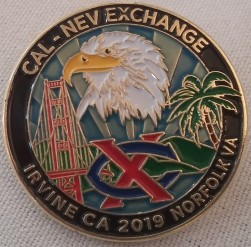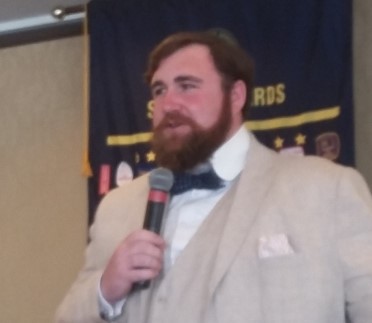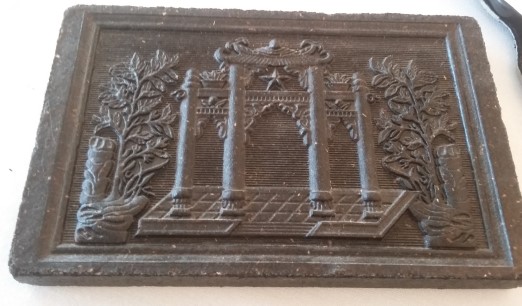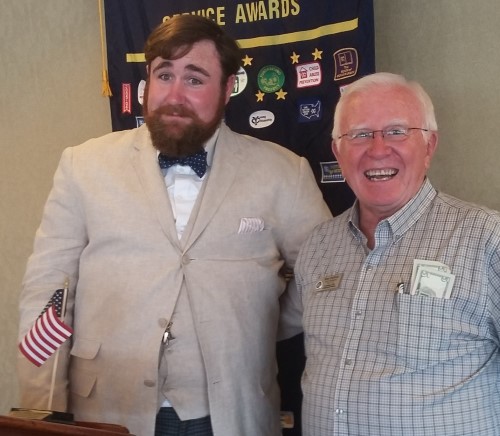Steve Pool – Reporter
President Ken DuFour called the meeting to order after people begged him to ring the bell he did quite forcefully and in his prayer asking God for grace forgiveness help and guidance Bill Bechtel led us in the flag salute which we did after a short story about flags from Billy.
ANNOUNCEMENTS

Bill handed out pins from the national convention. There were about 600 in attendance. We showed great spirit yet we took second place in the spirit award, we felt that we lost so we booed in protest. We hope that was received in good spirit!

Leo Fracalosy gave us an update on Wally Zigler is recovering, he’s not scheduled for any chemo just radiation and his wife’s going away so he will be on his own for a bit, with the help of some friends.
Ed Romeo brought the latest issue of the Oasis News and asked us to consider joining the senior citizens center.
PROGRAM

Darrell Rivers works for the Huntington Beach historical Society. He also consults for TV and film, he checks for the veracity of props and costumes things like counting stitches and checking that buttons are correct for the time. He also ensures accurate portrayals of historical scenes and does historical analysis for various films and TV shows.
A women’s group asked him for a talk but not about war. Darrell got his baptism in history with Civil War reenactments which his grandmother headed. Darrell loves that life and is one of the rare people in the world who has turned his passion into his paycheck. When the request came to him, he developed a series of talks on tea and coffee.
Tea is from one plant, Camellia Sinensis, which is very difficult to grow. Darrell has tried for many years to grow both tea and coffee here in our climate he’s had some success with coffee but none with tea.
Tea has many names and those names are mostly based on location and oxidation level. For example, Darjeeling tea is from Darjeeling, West Bengal, India; White, Yellow, Green and Black designations for tea refer to its processing that oxidizes the leaf. The lightest processing is withering the leaf and drying it, producing White tea. Green tea is withered, fixed (steamed or fried) and dried, it yields the highest caffeine content. Black is withered, rolled, oxidized and dried.
There is a legend built around tea. Chinese lore has an Emperor drinking some hot water and wind blew a leaf into the water. The Emperor thus discovering this remarkable drink. Another legend is that a great yogi set about identifying the safety and effect of all plants for people to eat. One day many samples the yogi tasted were very poisonous. The yogi saved himself by chewing on tea leaves.

Tea’s use in porridge is the first documented use of tea, dating back to 200 AD, Tea became popular as different processing and handling evolved. Matcha, a green tea, came along in the 8th Century, and powdered tea processed into bricks was popular by the 12th Century. Tea became both extraordinarily fancy and simple at the same time. Mongols preferred tea dust from tea bricks (as seen above) with salt and mares milk. Sounds delicious! The tea bricks from powder are lower quality but great for commerce due to great shelf life and ease of handling. One can imagine Mongol warriors having these bricks with them on their campaigns.
The East India Company brought tea to Britain in the 17th century. It was very expensive and served in cafés that were referred to as Penny Universities due to the heady conversation among the moneyed class. Soon they became more club-like and banned women. This caused Katherine Braganza, wife of King Charles II to bring tea into her home. Thus there came the terms “High Tea” and “Low Tea” with the elevation referring to the surface the tea was on. Low tea refers to setting the servings on low tables in living rooms and is the more elegant setting. High tea refers to a more bar-like setting without the frills of entertaining a houseguest.
Tea is an important icon in America. The Boston Tea Party is something we’re all taught in grade school about the ignition of our war for independence. In 1773 the market collapsed for tea due to overproduction. The East India Company was bound for failure and bankruptcy with literal boatloads of tea that it could not sell in Britain due to the glut. So it was determined that they would take the tea to the American colonies and sold with the King’s backing. Also, by decree, all goods going into the colonies had to be delivered by British ships. This allowed Britain to “protect” the colonies and extort other seafaring traders like the Dutch, French, etc.
The colonials knew what was going on and the settlements agreed not to buy the tea as it was too expensive given the glut conditions. The eastern coastline is rather good for smuggling so there would be no lack of tea by rejecting the British shiploads. When the time came, only Boston refused to buy theirs, all the others caved in.
It was reported the “Indians boarded the boat” and committed the destruction of the tea. A review of the Masonic Lodge attend-ance that night of their regular meeting showed attendance to be remarkably low. The crates were over 300 lbs each. Quite likely the men moved the crates to the edge of the boat and shoveled the loose tea out of the crates over the edge of the boat rather than flinging the entire crate and contents overboard with an overhead toss. It’s noted that few shots were fired that night. Not from trying to stop the destruction but stopping scavengers from picking up the tea piles that accumulated on the sand… it was low tide!
Colonists concertedly made a switch to coffee instead of tea. John Adams wrote many many letters to his wife. In some of his letters, he discussed his decision to embrace coffee.
China is rich with silk, porcelain, tea, etc. and silver or gold were the only things that they would trade for. Many attempts were made to smuggle tea production out of China. It was smuggled to India over the Himalayas. The East India Company began trading Opium to the Chinese instead of gold or silver while engaging India to supply tea. The opium trade created a lot of functioning addicts. The Chinese government tried to stop the trade but the British navy was much more powerful. They took Hong Kong!
Thanks for the great talk Darrell!

GREETER—Jim Fournier
